Excerpted from Phil Esposito's book "Thunder and Lightning" (available used on Amazon.com in hardcover for less than a dollar!)
I was traded to the New York Rangers on November 7, 1975, in my mind a day that lives in infamy.
[Phil has just been offered a million dollar signing bonus and six-year contract at four hundred thousand dollars per season to join the Vancouver Blazers of the WHA]
[Bruins General Manager] Harry [Sinden] and I had been talking contract and he hadn't offered me very much. I went back to see him. I didn't have an agent. I never brought up he Vancouver offer. I didn't want to use that. I just told him "I don't want to leave Boston. Come on, let's have something here." He offered me a six-year deal at four hundred thousand dollars a year. I felt it was fair, considering what I had done.
"You want a no-trade clause, Phil?" he asked me.
"Harry," I said, "you and I have been through so much together, I don't need a no-trade clause. If you tell me you're not going to trade me, that's good enough for me.
As we shook hands he said, "Phil, you will be here as long as I'm here."
That was in October, just before the 1975-76 season began on the fourth, and I was happier than a pig in [slop].
We were on the road, and I was playing well even though I didn't particularly like Don Cherry's coaching style.
[At this point Esposito runs into Jim Pattinson who tells him he should have taken his offer to join the Blazers because Boston is going to trade him]
The next morning the phone rang, and [my roomate] Hank picked it up. Hank said, "Phil, it's Grapes." "Grapes" was out nickname for Don Cherry. I wondered, it's seven-thirty in the morning. We don't play until tomorrow. Why is he waking me up?
Hank handed me the phone.
Cherry said, "I've got to talk to you." I thought to myself, Oh, Jesus. I said, "If you want to talk to me, you're going to have to come up and see me." I hung up on him.
Hank said, "What's up?"
I said, "I think I've been traded."
There was a knock on the door, and in came Don Cherry and Bobby Orr. Don was wearing the ugliest pajamas I ever saw in my life. Don made a lot of money in Canada by wearing really ugly clothes. Bobby Orr was in a T-shirt and a pair of slacks.
I was sitting at the end of my bed in my underwear, hungover, and I had my head in my hands.
"What the [frick] is going on, Grapes?"
He said, "Phil, I ... well, I ..."
"Come on. Tell me. I've been traded, haven't I?"
He said, "Yeah."
[Frick] me," I said. "For who? And where?" He looked at me, and looked at Bobby, who was standing by the window. I said, "If you tell me New York, I'm going to jump out that window."
The New York Rangers were our arch-rivals. I hated New York. Whenever we went to play at Madison Square Garden, all we got to see was the dingy block between 7th and 8th Avenues and 33rd and 34th Streets. We never saw the hot spots. We would fly in on Eastern Airlines the day of the game, play, stay in the Statler Hilton, a rundown hotel right across the street, and fly out the next day. New York was filthy. It was the last place I wanted to go.
"Bobby, open the window," Grapes said.
That's how I learned I was going to New York.On arrival in New York, Esposito found his familiar #7 taken by 16 year Rangers veteran Rod Gilbert and chose to simply double his customary #7 to the unusually high sweater number for the time of #77.
His first season of adjustment in New York would see Esposito play in 62 games and score 29 goals and 38 assists for 67 points to go along with his 16 points in the first 12 games of the season he played in Boston. While not able to reach the lofty league-leading point totals of 125-150 points as he had done with Boston, while being the first player to ever score 100 points in a season, Esposito still averaged 35 goals a season while in New York and 80 points over the final five full seasons of his career and led the Rangers in scoring three times.
On this date in 977 Esposito would score his 600th NHL goal versus the Vancouver Canucks, becoming the first Ranger to reach that milestone and only the third player ever to reach 600 after Gordie Howe and Bobby Hull. He would then go onto to notch his 1500th point early in the 1979 season against the Pittsburgh Penguins.
When he retired in 1981, he was second to Howe in all-time league scoring with 1,282 games played, 717 goals and 873 assists for 1,590 points for an average of 1.24 points per game over 18 NHL seasons.
Esposito was elected to the Hockey Hall of Fame in 1984 and had his original #7 famously retired by the Boston Bruins in 1987 when Ray Bourque, the then current wearer of #7 for Boston, pulled of his jersey to reveal a permanent change to #77 in Phil's honor.
This jersey style was first introduced by General Manager John Ferguson Sr. in the 1976-77 season and was the first departure in club history from the iconic diagonal "RANGERS" cresting. After proving unpopular with the tradition-bound Rangers fans, this style was only used for two seasons, the first without names on the back of the road jerseys and, thanks to a new NHL rule requiring them, with names on the back for the 1977-78 season.
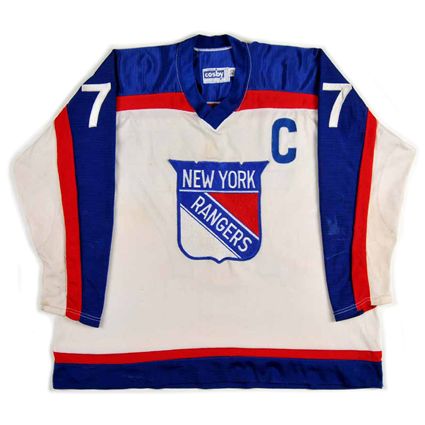
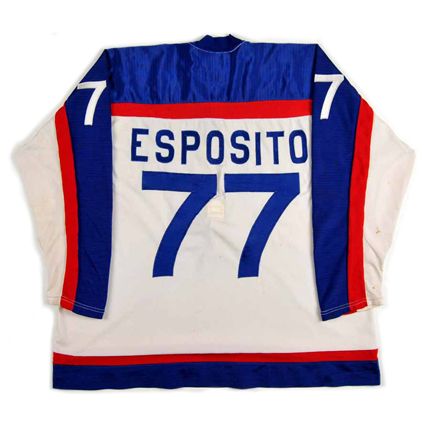
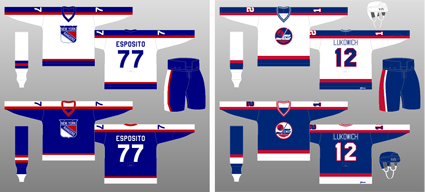
First up today is the "Legends of Hockey" biography on Phil Esposito.
Next up is the jersey retirement ceremony when the Bruins retired Esposito's #7 and Bourque famously shocks Phil and the stadium by giving up his number #7 to Esposito.
Here is Esposito, along with Ron Dugay, Dave Maloney and Anders Hedberg in a moment we suspect they'd all like to forget ever happened.
Unfortunately, it gets worse, as Esposito, Maloney, Hedberg and Ron Greschner take part in a sequel of even more embarrassing proportions.

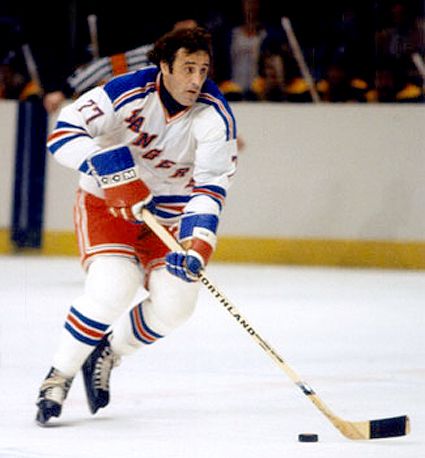
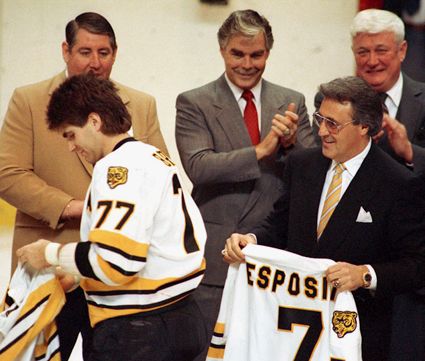
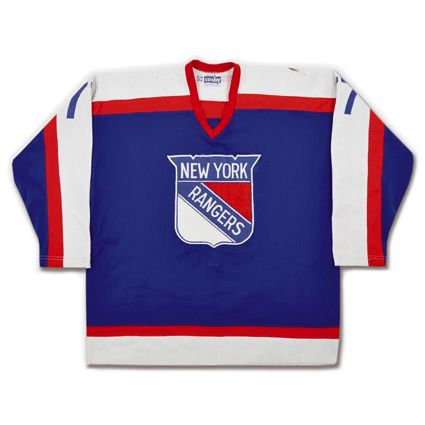
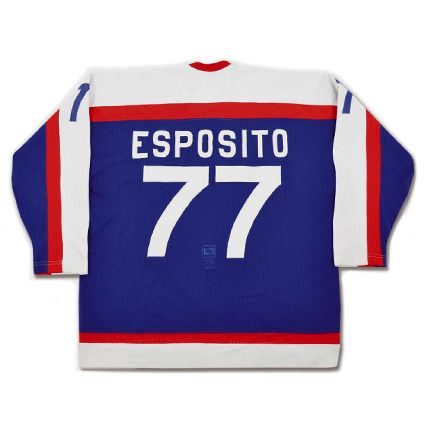










As a Ranger fan I hated that trade more than Espo did I promise you.
ReplyDeleteratelle outscored him every year after the trade figures if rangers had a healthy jean ratelle in 1972 they not boston would of won the stanley cup
ReplyDelete